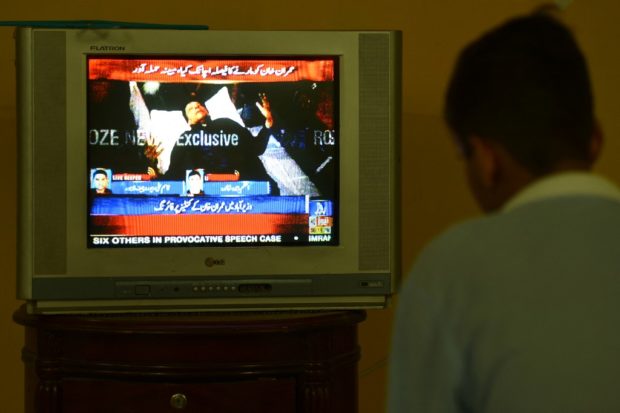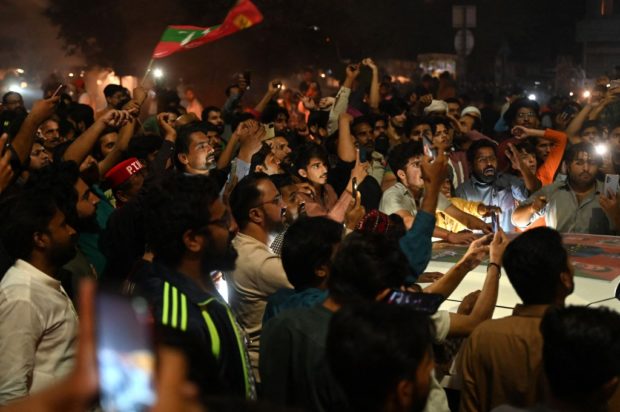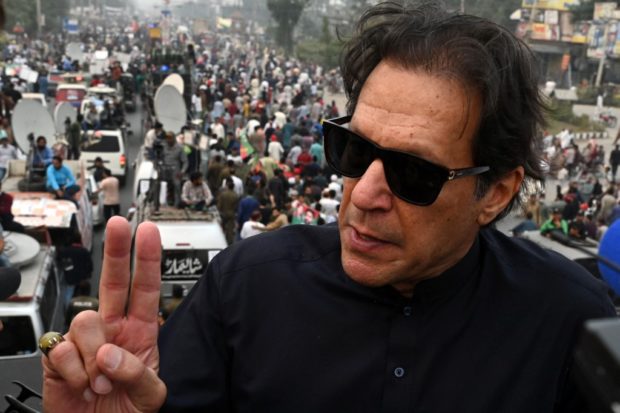Former Pakistan PM Khan recovering in hospital after assassination bid

A boy watches a television channel showing the news of Pakistan’s former prime minister Imran Khan, in Islamabad on November 3, 2022. Khan was in stable condition after being shot in the leg at a political rally on November 3 in what the country’s president deemed “a heinous assassination attempt”. (Photo by Farooq NAEEM / AFP)
Wazirabad, Pakistan — Former Pakistan prime minister Imran Khan was recovering in hospital Friday after a gunman shot him in the leg, with his supporters vowing the assassination attempt will not derail his “long march” bid to return to power.
The attack on his convoy, apparently by a lone gunman, killed one man and wounded at least 10, significantly raising the stakes in a political crisis that has gripped the South Asian nation since Khan’s ousting in April.
Khan “was stable and he was doing fine” at Shaukat Khanum hospital in the eastern city of Lahore, his doctor Faisal Sultan told AFP Friday.
Seemi Bokhari, a lawmaker with Khan’s Pakistan Tehreek-e-Insaf (PTI) party, said after visiting Khan the former premier was in high spirits.
“The doctors are allowing him to move … He is feeling perfectly well and he will soon be discharged,” she told AFP.
Article continues after this advertisementThe 70-year-old former international cricket star had been leading a campaign convoy of thousands since last week from Lahore to the capital Islamabad when he was attacked.
Article continues after this advertisementKhan suffered at least one bullet wound to his right leg when a gunmen sprayed pistol fire at his modified container truck as it drove slowly through a thick crowd in Wazirabad, around 170 kilometers (105 miles) east of Islamabad.
“Everyone who was standing in the very front row got hit,” former information minister Fawad Chaudhry, who was standing behind Khan, told AFP.
Senior aide Raoof Hasan said it was “an attempt to kill him, to assassinate him”.
Chaudhry said party officials would meet later Friday to discuss the immediate fate of Khan’s campaign march.
“The real freedom long march will continue and the movement for people’s rights will remain until an announcement on the general elections,” he tweeted.

Supporters of Pakistan’s former prime minister Imran Khan, take part in a protest against the assassination attempt on Khan, outside the hospital where Khan is admitted, in Lahore on November 3, 2022. (Photo by Arif ALI / AFP)
Threats
Party officials also called for supporters to stage rallies and marches across the country after Friday afternoon prayers, the most important of the week.
Protesters lit fires and blocked roads in several cities late Thursday as news of Khan’s shooting spread.
His campaign truck has become a crime scene for now, cordoned off and guarded by commandos as forensic experts comb the area.
Information Minister Marriyum Aurangzeb said Thursday the attacker had been taken into custody. Officials shared an apparent confession video that was circulating online.
“I did it because (Khan) was misleading the public,” says a dishevelled man in the leaked video, shown with his hands tied behind his back in what appears to be a police station.
He says he was angry with the procession for making a racket during the call to prayer that summons Muslims to the mosque five times a day.
Pervaiz Elahi, the chief minister of Punjab, said officers who leaked the video would be disciplined.
Pakistan has been grappling with Islamist militancy for decades, with right-wing religious groups having huge sway over the population.
It has been no stranger to assassination attempts during decades of political instability, and the powerful military has led the country several times.
Pakistan’s first prime minister, Liaquat Ali Khan, was shot dead at a rally in Rawalpindi in 1951. Another former prime minister, Benazir Bhutto, was killed in 2007 when a huge bomb detonated near her vehicle as she greeted supporters in the city of Rawalpindi.

In this photograph taken on November 1, 2022, Pakistan’s former prime minister Imran Khan speaks while taking part in an anti-government march in Gujranwala. (Photo by Arif ALI / AFP)
Kicked from power
Khan was booted from office in April by a no-confidence vote after defections by some of his coalition partners, but he retains huge support.
He was voted into power in 2018 on an anti-corruption platform by an electorate tired of dynastic politics, but his mishandling of the economy — and falling out with a military accused of helping his rise — sealed his fate.
Since then, he has railed against the establishment and Prime Minister Shehbaz Sharif’s government, which he says was imposed on Pakistan by a “conspiracy” involving the United States.
Khan and Shehbaz have for months traded bitter accusations of corruption and incompetence, raising the political temperature in a nation that is frequently at boiling point.
Khan has repeatedly told supporters he was prepared to die for the country, and aides have long warned of unspecified threats made on his life.
The attack drew international condemnation including from the United States, which had uneasy relations with Khan when he was in power.
“Violence has no place in politics, and we call on all parties to refrain from violence, harassment and intimidation,” US Secretary of State Antony Blinken said in a statement.